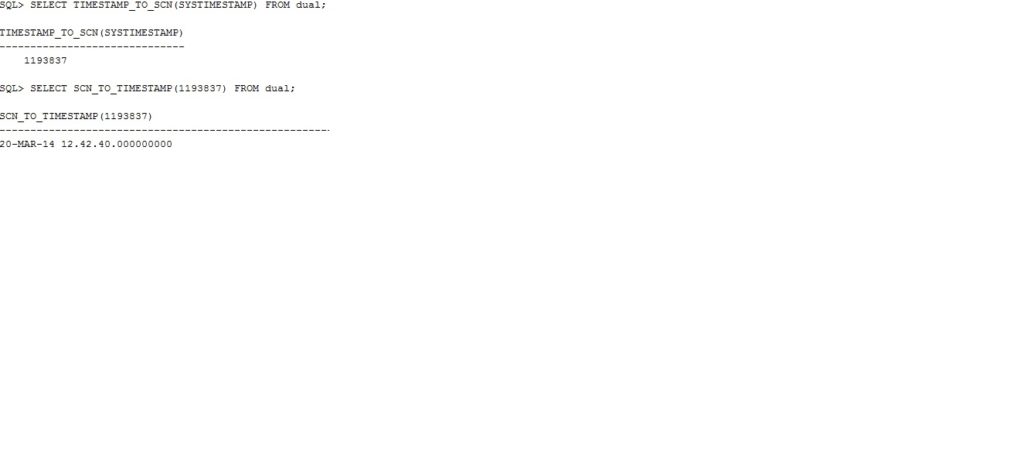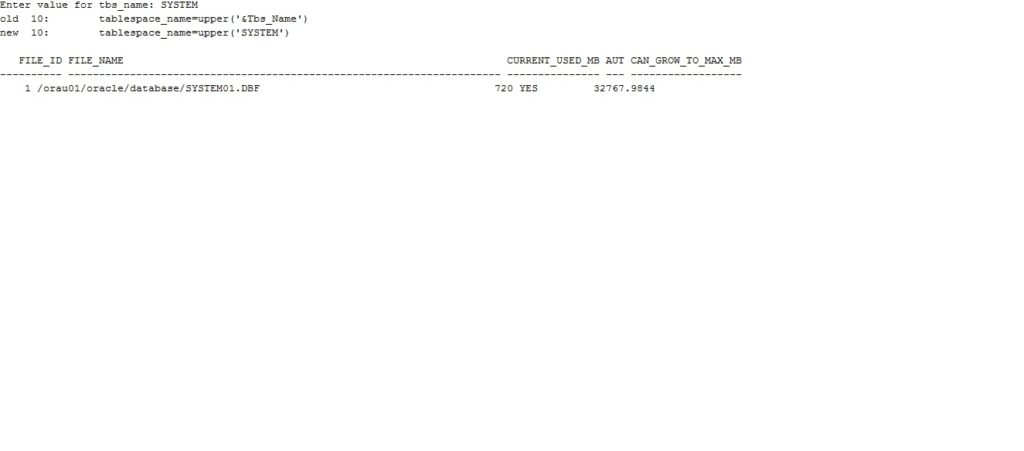| Script Name | Description |
|---|
| addmrpt.sql | Automatic Database Diagnostic Monitor (ADDM) report |
| addmrpti.sql | Automatic Database Diagnostic Monitor (ADDM) report |
| addmtmig.sql | Post upgrade script to load new ADDM task metadata tables for task migration. |
| ashrpt.sql | Active Session History (ASH) report |
| ashrpti.sql | Active Session History (ASH) report. RAC and Standby Database support added in 2008. |
| ashrptistd.sql | Active Session History (ASH) report helper script for obtaining user input when run on a Standby. |
| awrblmig.sql | AWR Baseline Migration |
| awrddinp.sql | Retrieves dbid,eid,filename for SWRF and ADDM Reports |
| awrddrpi.sql | Workload Repository Compare Periods Report |
| awrddrpt.sql | Produces Workload Repository Compare Periods Report |
| awrextr.sql | Helps users extract data from the AWR |
| awrgdinp.sql | AWR global compare periods report input variables |
| awrgdrpi.sql | Workload repository global compare periods report |
| awrgdrpt.sql | AWR global differences report |
| awrginp.sql | AWR global input |
| awrinfo.sql | Outputs general Automatic Workload Repository (AWR) information such as the size and data distribution |
| awrinput.sql | Common code used for SWRF reports and ADDM |
| awrload.sql | Uses DataPump to load information from dump files into the AWR |
| awrrpt.sql | Automated Workload Repository (AWR) report |
| awrrpti.sql | Automated Workload Repository (AWR) report |
| awrsqrpi.sql | Reports on differences in values recorded in two different snapshots |
| awrsqrpt.sql | Produces a workload report on a specific SQL statement |
| catalog.sql | Builds the data dictionary views |
| catblock.sql | Creates views that dynamically display lock dependency graphs |
| catclust.sql | Builds DBMS_CLUSTDB built-in package |
| caths.sql | Installs packages for administering heterogeneous services |
| catio.sql | Allows I/O to be traced on a table-by-table basis |
| catnoawr.sql | Script to uninstall AWR features |
| catplan.sql | Builds PLAN_TABLE$: A public global temporary table version of PLAN_TABLE. |
| dbfs_create_filesystem.sql | DBFS create file system script |
| dbfs_create_filesystem_advanced.sql | DBFS create file system script |
| dbfs_drop_filesystem.sql | DBFS drop file system |
| dbmshptab.sql | Permanent structures supporting DBMS_HPROF hierarchical profiler |
| dbmsiotc.sql | Analyzes chained rows in index-organized tables. |
| dbmspool.sql | Enables DBA to lock PL/SQL packages, SQL statements, and triggers into the shared pool. |
| dumpdian.sql | Allows one to dump Diana out of a database in a human-readable format (exec dumpdiana.dump(‘DMMOD_LIB’);) |
| epgstat.sql | Shows various status of the embedded PL/SQL gateway and the XDB HTTP listener. It should be run by a user with XDBADMIN and DBA roles. |
| hangdiag.sql | Hang analysis/diagnosis script |
| prgrmanc.sql | Purges from RMAN Recovery Catalog the records marked as deleted by the user |
| recover.bsq | Creates recovery manager tables and views … read the header very carefully if considering performing an edit |
| sbdrop.sql | SQL*PLUS command file drop user and tables for readable standby |
| sbduser.sql | SQL*Plus command file to DROP user which contains the standby statspack database objects |
| sbreport.sql | This script calls sbrepins.sql to produce standby statspack report. It must run as the standby statspack owner, stdbyperf |
| scott.sql | Creates the SCOTT schema objects and loads the data |
| secconf.sql | Secure configuration script: Laughable but better than the default |
| spauto.sql | SQL*PLUS command file to automate the collection of STATPACK statistics |
| spawrrac.sql | Generates a global AWR report to report performance statistics on all nodes of a cluster |
| spcreate.sql | Creates the STATSPACK user, table, and package |
| sppurge.sql | Purges a range of STATSPACK data |
| sprepcon.sql | STATSPACK report configuration. |
| sprepsql.sql | Defaults the dbid and instance number to the current instance connected-to, then calls sprsqins.sql to produce the standard Statspack SQL report |
| sprsqins.sql | STATSPACK report. |
| sql.bsq | Drives the creation of the Oracle catalog and data dictionary objects. |
| tracetab.bsq | Creates tracing table for the DBMS_TRACE built-in package. |
| userlock.sql | Routines that allow the user to request, convert and release locks. |
| utlchain.sql | Creates the default table for storing the output of the analyze list chained rows command. |
| utlchn1.sql | Creates the default table for storing the output of the analyze list chained rows command. |
| utlconst.sql | Constraint check utility to check for valid date constraints. |
| utldim.sql | Build the Exception table for DBMS_DIMENSION.VALIDATE_DIMENSION. |
| utldtchk.sql | This utility script verifies that a valid database object has correct dependency$ timestamps for all its parent objects. Violation of this invariant can show up as one of the following:Invalid dependency references [DEP/INV] in library cache dumps ORA-06508: PL/SQL: could not find program unit being calledPLS-00907: cannot load library unit %s (referenced by %s)ORA-00600[ kksfbc-reparse-infinite-loop] |
| utldtree.sql | Shows objects recursively dependent on given object. |
| utledtol.sql | Creates the outline table OL$, OL$HINTS, and OL$NODES in a user schema for working with stored outlines |
| utlexcpt.sql | Builds the Exception table for constraint violations. |
| utlexpt1.sql | Creates the default table (EXCEPTIONS) for storing exceptions from enabling constraints. Can handle both physical and logical rowids. |
| utlip.sql | Can be used to invalidate all existing PL/SQL modules (procedures, functions, packages, types, triggers, views) in a database so that they will be forced to be recompiled later either automatically or deliberately. |
| utllockt.sql | Prints the sessions in the system that are waiting for locks, and the locks they are waiting for. |
| utlpwdmg.sql | Creates the default Profile password VERIFY_FUNCTION. |
| utlrdt.sql | recompiles all DDL triggers in UPGRADE mode at the end of one of three operations:DB upgradeutlirp to invalidate and recompile all PL/SQLdbmsupgnv/dbmsupgin to convert PL/SQL to native/interpreted |
| utlrp.sql | Recompiles all invalid objects in the database. |
| utlscln.sql | Copies a snapshot schema from another snapshot site |
| utlsxszd.sql | Calculates the required size for the SYSAUX tablespace. |
| utltkprf.sql | Grants public access to all views used by TKPROF with verbose=y option |
| utluiobj.sql | Outputs the difference between invalid objects post-upgrade and those objects that were invalid preupgrade |
| utlu112i.sql | Provides information about databases prior to upgrade (Supported releases: 9.2.0, 10.1.0 and 10.2.0) |
| utlvalid.sql | Creates the default table for storing the output of the analyze validate command on a partitioned table |
| utlxaa.sql | Defines a user-defined workload table for SQL Access Advisor. The table is used as workload source for SQL Access Advisor where a
user can insert SQL statements and then specify the table as a workload source. |
| utlxmv.sql | Creates the MV_CAPABILITIES_TABLE for DBMS_MVIEW.EXPLAIN_MVIEW. |
| utlxplan.sql | Builds PLAN_TABLE: Required for Explain Plan, DBMS_XPLAN, and AUTOTRACE (replaced by catplan.sql) |
| utlxplp.sql | Displays Explain Plan from PLAN_TABLE using DBMS_XPLAN built-in. Includes parallel run information |
| utlxpls.sql | Displays Explain Plan from PLAN_TABLE using DBMS_XPLAN built-in. Does not include parallel query information |
| utlxrw.sql | Builds the REWRITE_TABLE for EXPLAIN_REWRITE tests |
| xdbvlo.sql | Validates XML DB schema objects |
|
| $ORACLE_HOME/sqlplus/admin |
| glogin.sql | SQL*Plus global login “site profile” file. Add SQL*Plus commands here to executed them when en a user starts SQL*Plus and/or connects |
| plustrce.sql | Creates the PLUSTRACE role required to use AUTOTRACE |
| pupbld.sql | Creates PRODUCT_USER_PROFILE |
|
| $ORACLE_HOME/sysman/admin/scripts/db |
| dfltAccPwd.sql | Checks for default accounts with default passwords |
| hanganalyze.sql | Hang analysis script for stand-alone databases |
| hanganalyzerac.sql | Hang analysis script for RAC clusters |





